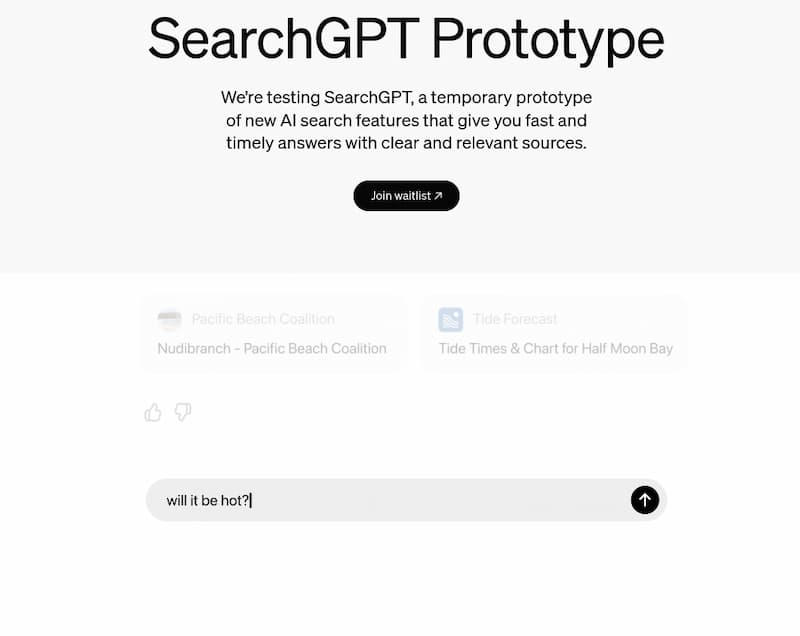OpenAI’s SearchGPT Prototype is a groundbreaking development in the realm of AI-powered search. This tool uses large language models. It provides better, more informative search results. SearchGPT can provide accurate, relevant answers by understanding user query contexts.
In a world where search engines are the gateways to info, we must innovate how we access and interact with data. The need for this is urgent. Enter SearchGPT. It’s a prototype that greatly advances search. SearchGPT seeks to combine AI’s power with real-time web data. It aims to provide fast, accurate, and context-rich answers. As we enter a new era of search, let’s explore how SearchGPT will change how we find information online.
The Evolution of Search: A New Way to Search
For years, people have used traditional search engines to navigate the vast internet. Yet, finding the right information often requires many searches. It involves sifting through irrelevant results and piecing together fragmented data. This can be frustrating and slow, especially when accurate information is urgent.
SearchGPT Prototype aims to solve these challenges. It will introduce a new way to search. It will be conversational, dynamic, and use real-time data. Unlike traditional search engines, SearchGPT is different. It doesn’t just match keywords and use ranking algorithms. Instead, it uses advanced AI to understand and respond to users in a more human-like way.
How SearchGPT Works
SearchGPT’s core is a powerful AI model. It is trained to have meaningful conversations. When a user inputs a query, SearchGPT provides an answer. It also allows follow-up questions, creating a smooth flow of information. This approach mimics a chat with a knowledgeable expert. Each question builds on the last, refining the search results.
For example, if someone were to ask, “What are the best practices for remote work?” SearchGPT might initially provide a general overview. The user might then ask, “What tools are recommended for remote teams?” and “How can managers maintain productivity in a remote setting?” With each query, SearchGPT narrows the information. It then gives a more relevant response.
Real-Time Integration with the Web
A key feature of the SearchGPT Prototype is its ability to summarize web pages. It helps users quickly grasp the key points. This feature has the potential to revolutionize how we consume and process information online.
This real-time capability is vital for local info and commerce. There, the most current data is crucial. If a user searches for “restaurants open near me,” SearchGPT can list nearby options. It would include their hours, special offers, and real-time reviews.
Partnering with Publishers and Creators
The success of any search engine, especially an innovative one like SearchGPT Prototype, depends on its relationship with publishers and content creators. We know this. So, we must work closely with publishers. We want their content to be accurate and prominent in search results.
Enhancing the Ecosystem
For decades, search engines have been vital in driving traffic to publishers’ sites. They help users find new content and experiences. AI-powered search tools like SearchGPT offer both risks and rewards for publishers. AI can help find valuable information by highlighting quality content. Some worry about content ownership and attribution. They fear it may hurt traditional search traffic.
To address these concerns, SearchGPT focuses on clear, in-line attribution and linking. SearchGPT’s responses give users the needed info and links to the original sources. This ensures that publishers get their due credit. Also, users can easily access the full content.
Also, we have tools for publishers. They can control how their content shows up in SearchGPT.This control is crucial for a healthy relationship between AI search tools and content creators. We have made it clear. Participation in SearchGPT does not mean inclusion in generative AI model training. Publishers can opt in to the search experience. This will protect their content from being used to train AI models.
Feedback and Collaboration
Building a new search experience requires feedback from the most affected: publishers and users. To that end, we launched the SearchGPT prototype to a small group of users and publishers. We aim to gather insights and refine the product. This iterative approach lets us address concerns and make changes. It ensures the final product meets all stakeholders’ needs.
Publishers are very interested in how their content performs in AI-driven search results. This prototype tests SearchGPT’s tech. It also explores how publishers can best engage with and benefit from AI search products. We will share our findings with our partners as we learn. This will help them find their way in the new landscape.
Industry Perspectives
SearchGPT’s launch has generated great interest in the media and publishing sectors. Experts have discussed AI search tools and their effects. They stress the need for a balance between technology and content.
Nicholas Thompson, CEO of The Atlantic, stressed AI search’s key role in future info discovery. He mentioned that “AI search will be a crucial tool for navigating the internet. It’s crucial, in these early days, that tech values and protects journalism and publishers. We’re excited to collaborate with OpenAI and explore new ways for readers to discover The Atlantic.”
Robert Thomson, CEO of News Corp, shared this view. He stressed the need for high-quality, reliable information in AI search. He remarked, “Sam and the talented team at OpenAI know that, for AI search to work, it must use the best, reliable information from trusted sources.” “For the heavens to be in equilibrium, technology and content must be in a symbiotic relationship. And provenance must be protected.”
These endorsements from industry leaders highlight the need for AI search tools. They must be both skilled and ethically integrated into the content ecosystem.
What Comes Next: The Future of SearchGPT
As with any innovative technology, the development of SearchGPT is an ongoing process. The current prototype is a big step forward. But there is much work left to fully realize its potential.
Expanding Capabilities
Future work will improve SearchGPT’s local info and commerce query support. This includes improving the accuracy of real-time data. It also means expanding the range of queries that SearchGPT can handle well.
Another key part of our roadmap is to integrate the best features of SearchGPT directly into ChatGPT. It will let users access advanced searches in a broader chat. This will make it easier to switch between general questions and specific searches.
Continuous Improvement Through Feedback
User and publisher feedback will continue to play a central role in shaping the future of SearchGPT. As more people use the prototype, we hope to get insights on how to improve it. This feedback loop is vital. It will refine the product. It will also align it with users’ needs and expectations.
We are particularly interested in hearing from publishers about their experiences with SearchGPT. To create a useful search tool, we must understand how our content performs, how users interact with it, and what can be improved.
Looking Ahead
The journey of SearchGPT Prototype is just beginning, but the potential it holds for transforming the search experience is immense. SearchGPT combines AI with the web’s vast resources. It makes search faster, more efficient, engaging, and intuitive.
We are committed to building a search tool. It must respect and enhance the bond between users, publishers, and the tech that connects them. The prototype phase is critical. We are excited to see how SearchGPT evolves with our partners’ feedback and collaboration.
The SearchGPT Prototype is still in early development. But, it has shown great promise. As it evolves, we will see more impressive features. They will transform how we search for and interact with information.
Conclusion
SearchGPT is more than a new tool. It is a shift in how we interact with information online. SearchGPT combines the best of AI and real-time web data. It offers a powerful, user-friendly search experience. User and partner feedback will be key as we improve our prototype. It will help shape the future of search.
With a rising need for quick, accurate info, SearchGPT is the top innovator. It will make search more efficient. It will also create new ways for publishers and creators to connect with their audiences. As we enter this new era of search, the possibilities are limitless, and the journey has just begun.
The release of the SearchGPT Prototype marks a significant milestone in the field of AI. It is a step towards a future where search engines can do more than return a list of web pages. They can offer users smarter, more helpful assistance.
FAQS
What are the key features of SearchGPT Prototype?
Conversational search, Relevant results, Continuous learning.
Is SearchGPT Prototype available for public use?
Currently, SearchGPT Prototype is in the experimental phase and not yet available for public use.
How can I get access to SearchGPT Prototype?
Access is currently limited to internal testing and research purposes.
How does SearchGPT Prototype differ from traditional search engines?
SearchGPT Prototype uses a more conversational and contextual approach to search.
How does SearchGPT Prototype ensure user privacy and data security?
SearchGPT Prototype prioritizes user privacy and data security.




